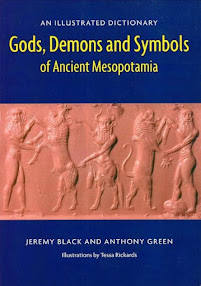Jeremy Black - Gods, Demons and Symbols of Ancient Mesopotamia (9.7 MB)
 Book downloads: 1465
Book downloads: 1465
The names and concepts of Mesopotamian religion are recorded in two languages, Sumerian and Akkadian. Where possible, words have been listed in this dictionary in their Sumerian form, with only a cross-reference under the Akkadian name. Thus the goddess Istar (Akkadian), for instance, is dealt with under her Sumerian name Inana. However, within the entries, the Sumerian or Akkadian name is used as appropriate, depending on the sources or periods referred to. A number of Mesopotamian names are commonly used in modern books (i... More >>>Book can be downloaded.
Note that, unfortunately, not all my books can be downloaded due to the restrictions of copyright. However, most of the books on this site do not have copyright restrictions. If you find any copyright violation, please contact me at  . I am very attentive to the issue of copyright and try to avoid any violations, but on the other hand to help all fans of magic to get access to information.
. I am very attentive to the issue of copyright and try to avoid any violations, but on the other hand to help all fans of magic to get access to information.
If you are having difficulty downloading books, or you are looking for a book that is not on the site (but maybe it is in my home library), please write me a email to

and I will try to help, I can send the book by e-mail
darkbooks.org began in early 2008 I am happy to donate my time to providing you this resource, I would also like to note, that, although I try, I do not always have enough time to deal with the site, including, unfortunately, I do not always have time to answer all letters, because I have to earn money for a living. If you can financially help me, it would free me from the worries of earning money for living, perhaps partially, but ideally completely, then all 100% of my time could be devoted to the site. Also I do pay monthly web server/files storage and hosting costs to keep this site on the air. Please consider making a donation to help me continue this activity and devote more time to it or at least offset the cost of paying for storage/hosting. Even a small contribution helps!
The names and concepts of Mesopotamian religion are recorded in two languages, Sumerian and Akkadian. Where possible, words have been listed in this dictionary in their Sumerian form, with only a cross-reference under the Akkadian name. Thus the goddess Istar (Akkadian), for instance, is dealt with under her Sumerian name Inana. However, within the entries, the Sumerian or Akkadian name is used as appropriate, depending on the sources or periods referred to.
A number of Mesopotamian names are commonly used in modern books (including this one) in Greek or Latin forms (especially place-names, e.g. (Greek) Babylon for Akkadian Babili), or in a form in which they occur in the Authorised Version of the Old Testament (especially the names of Assyrian kings, e.g. Sennacherib for Akkadian Sin-ahhe-eriba). Similarly, archaeological sites are sometimes known by their modern Arabic names, e.g. Abu Shahrain for Sumerian Eridu.
Of course we have no exact information on the pronunciation of the Akkadian or Sumerian languages, but scholars have reconstructed an approximate system based on comparison with other Semitic languages and on ancient transcriptions into Greek.
Ancient Mesopotamia was the home of some of the world's earliest cities, and the place where writing was invented. For these two major developments alone -- urban society and literate society -- it might justly be titled the 'cradle of civilisation', but in its literature, its religious philosophies and no less in its art it can also be placed firmly as the direct ancestor of the Western world. (by Jeremy Black)



 Book downloads: 1465
Book downloads: 1465
 . I am very attentive to the issue of copyright and try to avoid any violations, but on the other hand to help all fans of magic to get access to information.
. I am very attentive to the issue of copyright and try to avoid any violations, but on the other hand to help all fans of magic to get access to information.
 and I will try to help, I can send the book by e-mail
and I will try to help, I can send the book by e-mail